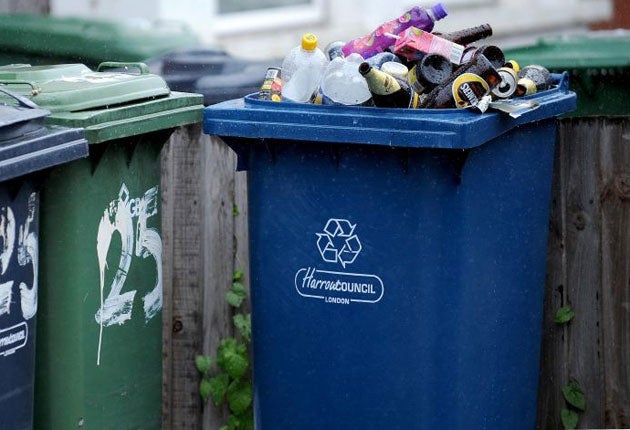Your support helps us to tell the story
From reproductive rights to climate change to Big Tech, The Independent is on the ground when the story is developing. Whether it's investigating the financials of Elon Musk's pro-Trump PAC or producing our latest documentary, 'The A Word', which shines a light on the American women fighting for reproductive rights, we know how important it is to parse out the facts from the messaging.
At such a critical moment in US history, we need reporters on the ground. Your donation allows us to keep sending journalists to speak to both sides of the story.
The Independent is trusted by Americans across the entire political spectrum. And unlike many other quality news outlets, we choose not to lock Americans out of our reporting and analysis with paywalls. We believe quality journalism should be available to everyone, paid for by those who can afford it.
Your support makes all the difference.The Government was accused of performing a U-turn on rubbish collections today after it was revealed councils will not be forced to bring back weekly bin rounds.
The publication of the long-awaited waste review signalled an end to local authority powers to penalise householders for "trivial" mistakes in putting out bins on the wrong day or putting recycling in the wrong container.
But with the cost of switching from fortnightly rubbish collections to weekly rounds believed to run to hundreds of millions of pounds, the Government was forced to admit it could not deliver on its pledge to ensure more frequent waste services.
Environment Secretary Caroline Spelman said ministers wanted to make it easier for the public to recycle at home and on the go, and to remove measures which encouraged councils to cut the scope of collections.
Communities and Local Government Secretary Eric Pickles said the Government was calling time on the "town hall Taliban", stripping them of their powers to impose "unfair" bin fines and charges.
Mr Pickles had previously pledged to reverse the move to "unpopular and unhygienic" fortnightly rubbish collections by councils and make them bring back weekly bin rounds.
While the Government said it would work with councils to increase the frequency and quality of rubbish rounds, and that the public had a "reasonable expectation" that household waste collections should be weekly, particularly for "smelly" waste, there was no pot of money to help councils make the switch back.
In the Commons, shadow environment minister Jamie Reed criticised the review for containing no waste recycling targets for England and abandoning Labour's plans to move to a "zero-waste Britain", and accused the Government of doing a U-turn on its pledge to enforce weekly collections.
The costs of reverting to weekly bin collections across England are believed to be upwards of £100 million and potentially as much as £500 million.
Councils would be hit by the cost of increased bin rounds and renegotiating waste contracts, as well as the possibility of higher landfill taxes and EU fines for missing waste targets if recycling rates fall and rubbish increases as a result of the changes.
More than half of English councils pick up domestic waste fortnightly - though some have weekly food waste collections - saying it saves money, boosts recycling rates and is widely accepted by residents.
Asked why the Tories were breaking their pledge to bring back weekly rubbish collections, Mrs Spelman said the country's financial situation had been worse than expected when they got into power.
"My department, in common with most departments, had to make some difficult choices, and the public are well aware of that. Realistically we will do what we can.
"In the spirit of localism, central government is all the time looking to enable local councils to respond to local needs, and having a one-size-fits-all policy is not the right answer for that."
However, town halls will be prevented from taking householders to court and imposing £1,000 fines for minor issues such as putting recycling in the wrong box.
Ministers said they would also be looking at reducing fixed penalty notices, which range between £75 and £110, and making sure they were only issued to "neighbours from hell" and the small minority who blight neighbourhoods with rubbish.
The Government has already said it will scrap councils' ability to introduce "pay as you throw" schemes to penalise householders who produce more waste, labelling the measures brought in by Labour as "bin taxes".
Mrs Spelman was unable to say how much of a reduction in the number of fines the changes would deliver, but said councils that fined people for minor mistakes lost the support of the public and the new set-up would "encourage an atmosphere where people want to recycle".
Other measures laid out in the review to reduce waste and boost recycling include incentives for householders who recycle, recycling-on-the-go schemes, better services for businesses and voluntary deals focusing on the hospitality industry, plastic bags, paper, junk mail, textiles and construction waste.
An action plan on anaerobic digestion, a process which can turn food and farm waste into energy, aims to help industry grow in the next few years to deliver green jobs and green energy.
The Government will also consult on introducing landfill restrictions on wood waste and review the case for bringing in landfill bans on other materials including metals, textiles and biodegradable waste.
Six months ago, ministers said they were "not minded" to bring in any landfill restrictions in England for the time being, after the move was considered by the previous Government.
The review also said Government will work with business to encourage more recycled content in packaging and to make packaging more recyclable, will consult on increased targets on packaging producers from 2013 and work to remove barriers to improve energy from waste schemes.

Join our commenting forum
Join thought-provoking conversations, follow other Independent readers and see their replies
Comments